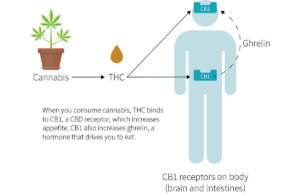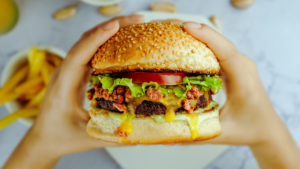"Munchies": The Connection Between Cannabis and Appetite
Cannabis and Appetite: A Complex Relationship
The “munchies” are a common thing that people reference in cannabis culture; it’s the commonly held belief that cannabis is known to stimulate appetite. Some may even claim that cannabis can lead to an increase in body weight, which the jury is still out for in terms of clinical studies.
What is the relationship between cannabis and appetite? Why are many medical cannabis patients using cannabis when facing some of the most difficult medical conditions that affect their appetite and weight?
In this article, we will learn about the connection between cannabis and appetite stimulation, and why many patients are getting their medical cannabis card to help manage their appetite when living with conditions like HIV-associated wasting syndrome, cancer-related cachexia, or anorexia nervosa.
Cannabis and the Endocannabinoid System (ECS)
As with the majority of cannabis medicine, the connection between cannabis and appetite hinges on the endocannabinoid system (ECS).
The ECS exists in the bodies of all mammals, and it essentially acts as a regulator of all bodily systems, including, but not limited to those that regulate sleep, mood, appetite, memory, and reproduction, working to bring the body into balance or homeostasis. It can be best described by Dr. Ethan Russo as “a key mediator of physiological homeostasis, thus ensuring that various bodily systems function within tight parameters with neither a deficiency nor excess of activity”.
Munchies are believed to occur when THC in cannabis partially binds and activates the cannabinoid receptor type 1 (CB1) found in various body tissues. CB1 receptors have distinct roles in different regions of the body that collectively contribute to an increased appetite.
In the basal ganglia, the CB1 heightens the pleasure derived from eating, while in the limbic forebrain, it enhances the palatability of food. Within the stomach and small intestine, CB1 influences ghrelin, an appetite-stimulating hormone that accelerates digestion. Additionally, CB1 receptors in the hypothalamus and rhombencephalon, areas of the brain, play a role in regulating food intake.

This complex interplay ultimately results in the “munchies” experienced by some cannabis users.
The Connection Between Cannabis and Body Weight
Understanding the link between cannabis and body weight can be quite complex.
Some studies have shown conflicting results on whether cannabis can affect body weight, and if so, exactly how and why. On one hand, certain observational studies suggest that cannabis might be associated with a smaller waist, lower BMI, and a lower risk of obesity. However, these studies rely on people sharing their own cannabis use, which may not always be accurate.
On the other hand, more reliable clinical trials dating back to the 1970s and 1980s conducted in controlled hospital settings indicate that cannabis could lead to weight gain. It’s important to note that these trials were relatively short and involved smaller groups of people. So, while some studies show little to no weight gain with cannabis, others suggest there could be some weight gain, especially in controlled environments.

The relationship between cannabis and body weight is still an area of ongoing research, however, examining the way cannabis and appetite correlate in certain medical populations, such as those living with HIV-Associated Wasting Syndrome, Anorexia Nervosa, and Cancer-Associated Cachexia is leading to more understanding.
Cannabis and HIV-Associated Wasting Syndrome and Weight Loss
Those who have been a part of cannabis culture for a long time will often credit the HIV/AIDS advocates who fought for patient rights for access to medical cannabis in the early 1990s for much of why we have the medical cannabis movement we have today. One of the reasons that early advocates fought for medical cannabis was because they saw the beneficial effects it was having for increasing caloric intake and combatting lower body weight and lower BMI for those humans living with these conditions.
In a study published in the Journal of Acquired Immune Deficiency Syndromes, researchers examined the impact of the synthetic cannabinoid dronabinol (synthetic THC) on the food intake of ten HIV-positive participants. They found that Dronabinol increased the daily food intake by encouraging participants to eat more frequently throughout the day.

Scientists have also identified a connection between THC and hunger-stimulating hormones. In a study conducted at the University of California involving seven HIV-infected men, insulin levels, as well as plasma levels of ghrelin, leptin, and PYY, were measured before and after the participants received either smoked cannabis or a placebo in a clinical trial. The results revealed that cannabis treatment led to increased levels of both ghrelin and leptin, ultimately boosting hunger and appetite.
In contrast, those who received a placebo experienced either a decrease or no significant change in these hormone levels, increasing the scientific evidence that cannabis, specifically smoked cannabis increases appetite for HIV-infected patients.
Increasing Food Intake and Weight Gain in those with Anorexia Nervosa
Unfortunately there aren’t many studies looking at smoked cannabis and its effect on anorexia nervosa.
One study, however, observed that dronabinol, the synthetic THC compound, had an effect on weight gain in 25 women who lived with anorexia nervosa, showing results in increased weight gain that a placebo and a wash-period did not show.
The sciences concluded that this synthetic THC “therapy was well tolerated. During four weeks of exposure, it induced a small but significant weight gain in the absence of severe adverse events”
Cannabis and Cancer-Associated Cachexia
Cancer cachexia is a complex syndrome characterized by severe weight loss, muscle wasting, and nutritional depletion that often occurs in cancer patients and significantly impacts their quality of life.
In 2002 study saw that dronabinol (synthetic THC) had the potential to increase body weight in those with cancer cachexia, however, it was not in enough of a way to show any major health improvement. However, it should be noted that the dose of dronabinol in the study was 2.5mg, 5mg a day, which is a low dose compared to what is available in dispensaries nowadays when you get your medical cannabis card.
Another 2006 study tested the differences that cannabis extract, THC, and a placebo had on quality of life of patients with cancer-associated cachexia. The study found that there were no significant differences in appetite, quality of life, or side effects among the three groups, but 69-73% of patients reported increased appetite across all three trial groups.

A study published in September 2023 surveyed 934 patients diagnosed with a variety of cancers, 15% of respondents identified as current cannabis consumers. Of that population, 49% identified the desire to increase appetite as one of the main reasons for using cannabinoids.
Further Need for Scientifically Exploring Cannabis and Appetite in Smoked Marijuana Studies
The unfortunate thing about cannabis being under prohibition for so long is that there are few scientific studies that examine the connection between smoked marijuana flower on appetite. As we’ve demonstrated above, many of the studies on appetite, especially in relation to certain medical conditions, are limited to synthetic products that mimic the natural effects associated with THC.
One study above showed that smoking cannabis may increase ghrelin and leptin, ultimately boosting hunger and appetite, and we can’t discount the millions of accounts of cannabis leading to the “munchies” as significant evidence that cannabis affects appetite.
As prohibition starts to lift on cannabis research, we can only hope that more research and peer reviewed studies will help provide a sufficient theoretical explanation as to why cannabis causes munchies, and thus may affect body weight and food intake.
The Potential for Endocannabinoid Agonists in Weight Loss
Because there has been such a long-time connection between cannabis, appetite, food intake, and body weight, there is an emergent body of research that is looking at the role of endocannabinoid agonists as a mechanism to reduce obesity rates.
Since it’s been shown that the CB1 receptor is connected to appetite, the pleasure we derive from eating, and the palatability of foods, there have been initial animal studies that attempt to find endocannabinoid agonists or CB1 blockers, but no drug has yet been FDA approved that would achieve this.
Explore Cannabis for Your Appetite with Compassionate Clinics of America
Many people with medical conditions such as HIV/AIDS, cancer, and anorexia nervosa are turning to medical cannabis as a mechanism to manage their weight as they live through these conditions.
Cannabis has forever long been associated with appetite, both in cannabis lore, and an increasing body of evidence is showing that medical cannabis is beneficial for stimulating appetite in those living with medical conditions that result in a reduced body mass index.
If you or someone you love is living with a condition that negatively impacts your appetite and are considering medical cannabis as a way to stimulate it, reach out to Compassionate Clinics of America today to discuss whether a medical cannabis card is right for you. While you’re here, stop by the recipes section of our website to learn how to cook with cannabis!
We operate across Arizona, Arkansas, California, Connecticut, Delaware, Georgia, Illinois, Iowa, Louisiana, Maine, Maryland, Massachusetts, Michigan, Minnesota, Missouri, Montana, Nevada, New Jersey, New York, Ohio, Oklahoma, Pennsylvania, Texas, Utah, Vermont, Virginia, & West Virginia, to help people re-imagine health and wellness through plant medicine. We look forward to serving you!

























